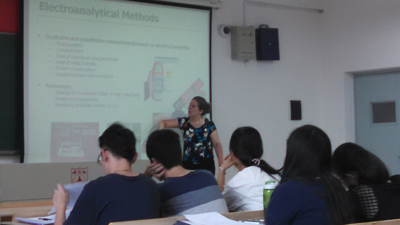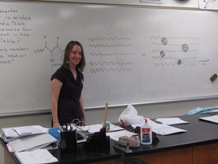Department of Chemistry, School of Biomedical Engineering
and Department of Chemical & Biological Engineering
Colorado State University, Fort Collins, CO
Principal Investigator: Dr. Melissa Reynolds, Professor and Boettcher Investigator
Education
CSU Courses Taught by Dr. Reynolds:
- GRAD550 - STEM Communication (guest/co-taught); 2022-2023
- CHEM601 - Responsible Conduct in Chemistry Research; 2017
- CHEM107 - Fundamentals of Chemistry; 2012, 2015-2016
- CHEM301 - Advanced Scientific Writing; 2012, 2014-2015
- CHEM335 - Introduction to Analytical Chemistry; 2014
- CHEM550B - Materials Chemistry-Soft Materials; 2011-2014
- CHEM530C - Bioanalytical Chemistry; 2012
- CHEM431 - Instrumental Analysis; 2010-2011
- CHEM532 - Advanced Chemical Analysis II; 2011
- CHEM651A - Special Topics in Chemistry-Analytical Chemistry; 2010
- CHEM515 - Polymer Chemistry; 2009
International Courses Taught
- Nanjing University, China
- Bioanalytical Chemistry: Biosensors, 2015
- Shanghai Jiao Tong University – Zhiyuan Honors College, China
- Bioanalytical Chemistry: Biosensor Measurements, 2017
- Bioanalytical Chemistry: Biomaterials, 2017

Dr. Melissa Reynolds, Teaching bioanalytical chemistry at Nanjing University, China
Prof. Reynolds was invited to China in 2015 and 2017 to teach summer short courses in bioanalytical chemistry. Prof. Reynolds was part of a team consisting of chemistry faculty from Colorado State University, University of Ontario Institute of Technology, and University of Michigan. In 2015, the summer courses were hosted by Nanjing University, but students also attended from Tsinghua University and Wuhan University. In 2017, courses were conducted at Shanghai Jiao Tong University.
CHIP: Colorado Higher-Education Interdisciplinary Program

CHIP is an NSF-sponsored (GK-12) multi-disciplinary research and teaching program in biomedical engineering. The CSU program focuses on the discovery and understanding of cell communication and has two components: a biosensor research project and the K-12 classroom experience. The research and design of the biosensor require the cooperation of professors and graduate fellows in biology, chemistry, computer science, electrical and computer engineering, and mathematics. While working on research projects within their masters or doctoral programs, graduate fellows spend time in a K-12 classroom, developing and delivering lessons related to the project. Many of these lesson plans are disseminated through the CHIP website for teachers across the country to access and use.
Group member Sarah Lantvit was a program fellow and Prof. Reynolds is a collaborating faculty members. Group member Cherelle Bishop was also a GK-12 program fellow from the Reynolds group. The links below highlight recent activities in the GK-12 program:

